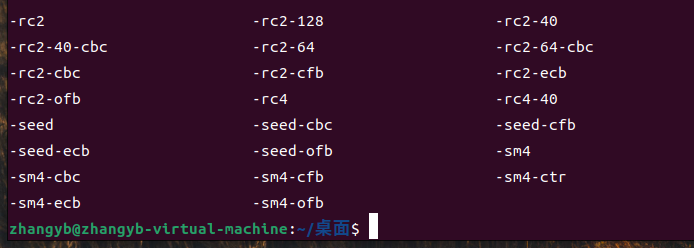open-api 算法实现
作者:20201303张奕博
要求:
- 推荐在openEuler中实现 ,参考https://www.cnblogs.com/rocedu/p/6012545.html第三节
- 提交相关代码码云(或github)链接(我使用博客园)
- 提交不少于6张编译测试过程截图
- 至少包含SM4,SM3的测试
1.检查版本

2.检查sm2 sm3
$ ./apps/openssl ecparam -list_curves | grep SM2
$ echo -n "abc" | ./apps/openssl dgst -SM3

3.检查函数
./apps/openssl enc -ciphers

4.测试SM4
代码:
#include <stddef.h>
#include <stdio.h>
#include <stdlib.h>
#include <string.h>
#include "openssl/err.h"
#include "openssl/evp.h"
/* Before OpenSSL 1.1.1-pre1, we did not have EVP_sm4_ecb() */
#if defined(OPENSSL_VERSION_NUMBER) \
&& OPENSSL_VERSION_NUMBER < 0x10101001L
static const EVP_CIPHER *(*EVP_sm4_ecb)()=EVP_aes_128_ecb;
#endif
typedef struct {
const unsigned char *in_data;
size_t in_data_len;
int in_data_is_already_padded;
const unsigned char *in_ivec;
const unsigned char *in_key;
size_t in_key_len;
} test_case_t;
void test_encrypt_with_cipher(const test_case_t *in, const EVP_CIPHER *cipher)
{
unsigned char *out_buf = NULL;
int out_len;
int out_padding_len;
EVP_CIPHER_CTX *ctx;
ctx = EVP_CIPHER_CTX_new();
EVP_EncryptInit_ex(ctx, cipher, NULL, in->in_key, in->in_ivec);
if (in->in_data_is_already_padded)
{
/* Check whether the input data is already padded.
And its length must be an integral multiple of the cipher's block size. */
const size_t bs = EVP_CIPHER_block_size(cipher);
if (in->in_data_len % bs != 0)
{
printf("ERROR-1: data length=%d which is not added yet; block size=%d\n", (int) in->in_data_len, (int) bs);
/* Warning: Remember to do some clean-ups */
EVP_CIPHER_CTX_free(ctx);
return;
}
/* Disable the implicit PKCS#7 padding defined in EVP_CIPHER */
EVP_CIPHER_CTX_set_padding(ctx, 0);
}
out_buf = (unsigned char *) malloc(((in->in_data_len>>4)+1) << 4);
out_len = 0;
EVP_EncryptUpdate(ctx, out_buf, &out_len, in->in_data, in->in_data_len);
if (1)
{
printf("Debug: out_len=%d\n", out_len);
}
out_padding_len = 0;
EVP_EncryptFinal_ex(ctx, out_buf+out_len, &out_padding_len);
if (1)
{
printf("Debug: out_padding_len=%d\n", out_padding_len);
}
EVP_CIPHER_CTX_free(ctx);
if (1)
{
int i;
int len;
len = out_len + out_padding_len;
for (i=0; i<len; i++)
{
printf("%02x ", out_buf[i]);
}
printf("\n");
}
if (out_buf)
{
free(out_buf);
out_buf = NULL;
}
}
void main()
{
int have_sm4 = (OPENSSL_VERSION_NUMBER >= 0x10101001L);
int have_aes = 1;
const unsigned char data[]=
{
0x01, 0x23, 0x45, 0x67, 0x89, 0xab, 0xcd, 0xef,
0xfe, 0xdc, 0xba, 0x98, 0x76, 0x54, 0x32, 0x10,
};
unsigned char ivec[EVP_MAX_IV_LENGTH]; ///< IV 向量
const unsigned char key1[16] = ///< key_data, 密钥内容, 至少16字节
{
0x01, 0x23, 0x45, 0x67, 0x89, 0xab, 0xcd, 0xef,
0xfe, 0xdc, 0xba, 0x98, 0x76, 0x54, 0x32, 0x10,
};
test_case_t tc;
tc.in_data = data;
tc.in_data_len = sizeof(data);
tc.in_data_is_already_padded = (tc.in_data_len % 16)==0; // Hard coded 16 as the cipher's block size
tc.in_key = key1;
tc.in_key_len = sizeof(key1);
memset(ivec, 0x00, EVP_MAX_IV_LENGTH);
tc.in_ivec = ivec;
#if defined(OPENSSL_NO_SM4)
have_sm4 = 0;
#endif
if (have_sm4)
{
printf("[1]\n");
printf("Debug: EVP_sm4_ecb() test\n");
test_encrypt_with_cipher(&tc, EVP_sm4_ecb());
}
#if defined(OPENSSL_NO_AES)
have_aes = 0;
#endif
if (have_aes)
{
printf("[2]\n");
printf("Debug: EVP_aes_128_ecb() test\n");
test_encrypt_with_cipher(&tc, EVP_aes_128_ecb());
}
}

5.测试SM3
#include <stdio.h>
#include <string.h>
#include <openssl/evp.h>
#include <openssl/err.h>
void tDigest(){
unsigned char md_value[EVP_MAX_MD_SIZE];
unsigned int md_len;
EVP_MD_CTX *mdctx;
mdctx = EVP_MD_CTX_new();
char msg1[] = "20201303";
char msg2[] = "ZHANGyibo";
EVP_MD_CTX_init(mdctx);
EVP_DigestInit_ex(mdctx, EVP_sm3(), NULL);
EVP_DigestUpdate(mdctx, msg1, strlen(msg1));
EVP_DigestUpdate(mdctx, msg2, strlen(msg2));
EVP_DigestFinal_ex(mdctx, md_value, &md_len);
EVP_MD_CTX_destroy(mdctx);
printf("Debug:Message1%s and Message2%s digest to:\n",msg1, msg2);
for(int i = 0; i<md_len; i++){
printf("0x%02x ", md_value[i]);
}
printf("\n");
}
int main(){
OpenSSL_add_all_algorithms();
tDigest();
return 0;
}




